


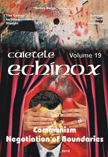
Keywords: Romania; Communist regime; Volk und Kultur Journal; Cultural Policies; Liberalization; Censorship.
The study aims to illustrate the effect of political power within the literary field between 1965-1975 as reflected in the German periodical Volk und Kultur. Next to the weekly Karpatenrundschau or to the important monthly magazine of literature Neue Literature, the periodical Volk und Kultur could not always come off the cultural policy conducted by Ceauşescu regime. Thus, by analyzing the published literary texts and translations in the periodical Volk und Kultur we aim at describing important phenomena of cultural policy during the liberalization between 1968-1971, followed by an increasing dogmatization period after July 1971.The study also provides an overview of the dynamics between cultural policy and the published literature (mainly translations of Romanian authors) in the periodical Volk und Kultur.
More...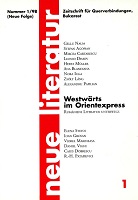
Aus dem Rumänischen von Gerhardt Csejka
More...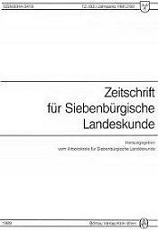
Keywords: Transylvanian Province; Romanian Literature; German Literature
Die folgenden, kurzen Überlegungen können und wollen keinesfalls den Anspruch auf Vollständigkeit in der Behandlung ihres thematischen Vorwurfs erheben. Sie verstehen sich lediglich als Anmerkungen zu einem äußerst vielschichtigen Problemkomplex, dessen gründliche Auslotung den hier gegebenen Rahmen sprengen würde, ganz abgesehen davon, daß die Prozeßhaftigkeit ihres Gegenstands Weiterungen herausfordert, deren Grenzen vom Standort des Jetzt und Hier kaum abzustecken sind. So mag das zu Sagende als Anregung gelten zu Diskussion und Gespräch. Wenn ihm das gelingt, hat es seinen bescheidenen Zweck erfüllt.
More...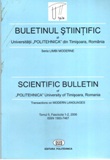
Keywords: Grammatikalisierung; Bestimmten Artikel; semantisch-pragmatischen Obligativität;
In der vorliegenden Arbeit wird von Ch. Lehmanns (1985) Theorie über die Grammatikalisierung ausgegangen. Der Grammatikalisierungsgrad des rumänischen und deutschen bestimmten Artikels und die Kontexte der semantisch-pragmatischen und der grammatischen Obligativität werden ermittelt.
More...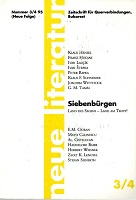
German writing authors in Transsilvanian and their handling of Romanian
More...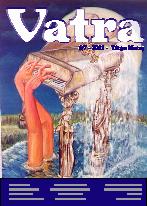
Dialogue with Richard Wagner.
More...Stimată doamnă director Beate Köhler, pe 6 decembrie 2012, la Chișinău, va fi inaugurată expoziția „Herta Müller: cercul drăcesc al cuvintelor”. Vă rog să ne vorbiți, pentru început, despre acest important eveniment, care va avea loc la Muzeul de Istorie și Arheologie din Moldova. Cum a apărut ideea organizării expoziției, pe ce concept se bazează, în ce orașe a mai fost prezentată?
More...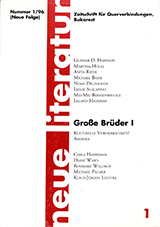
review of: ---------------------- RICHARD WAGNER, In der Hand der Frauen, Roman, Deutsche Verlags-Anstalt Stuttgart, 1995, 190 Seiten
More...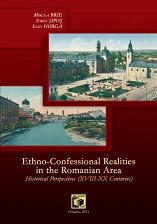
Keywords: Romanian-German literature; identity; migration; periphery; center
Language and literature have an essential role in determining and conserving ethnical identity. German minorities and German literature from Romania have received great interest in the last few decades, although the ethnical groups denoted by the coined term “rumäniendeutsch” (Romanian-German) consisting of Banat-Swabians (Banater Schwaben), Transylvanian Saxons (Siebenbürger Sachsen), and Bukovina Germans (Buchenlanddeutschen), have been experiencing dramatical decrease in population due to the burdensome heritage of the past. The mass-murders, the deportation, enforced exodus or chosen emigration has had a deep impact on the regional literary creation: a great number of German writers, poets, literary critics born in Romania moved to the Federal Republic of Germany, the German cultural and literary activity in Romania has shrunk extremely and writing the obituary of the Romanian-German literature has been a sore subject of debate. Following some traces of historical and socio-political contexts this paper aims at the investigation of identity-related notions in the field of Romanian-German literature of the twentieth century, trying to elucidate and exemplify notions of minority literature, concepts of island, periphery, border, center, “volksdeutsch”, home or “Heimat” and notions of belonging, the experience of migration and displacement in the literary vision and creation of some German authors born in Romania.
More...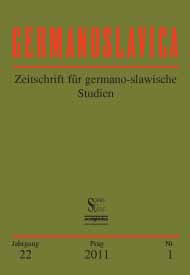
Robert FLINKER is one of the few prose writers in the German-speaking literature of Bukovina. His novel Purgatory demonstrates an obvious similarity with Franz KAFKA’s novel The Trial. It concerns the topic (the motive of court), typology of the protagonist’s image (Josef K. – Gregor Gusum), and plot development. Despite these obvious analogies, as well as some biographical parallels, which are crucial for both authors, their novels are profoundly different. In his The Trial, KAFKA proceeds from an Old Testamental and Hebrew-Cabbalistic tradition, portraying an exhausting, but hopeless struggle of his novel’s hero against pervasive and brutal power, whereas FLINKER roots his concept of individual’s existential guilt in New Testamental Christian ideas inspired by the Sermon on the Mount. The difference of intentions conveys, in the first place, a different ethical message of the analyzed works.
More...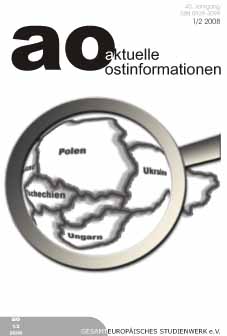
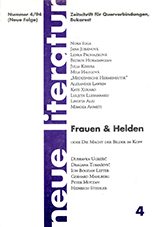
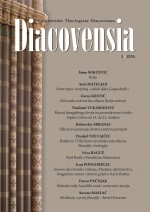
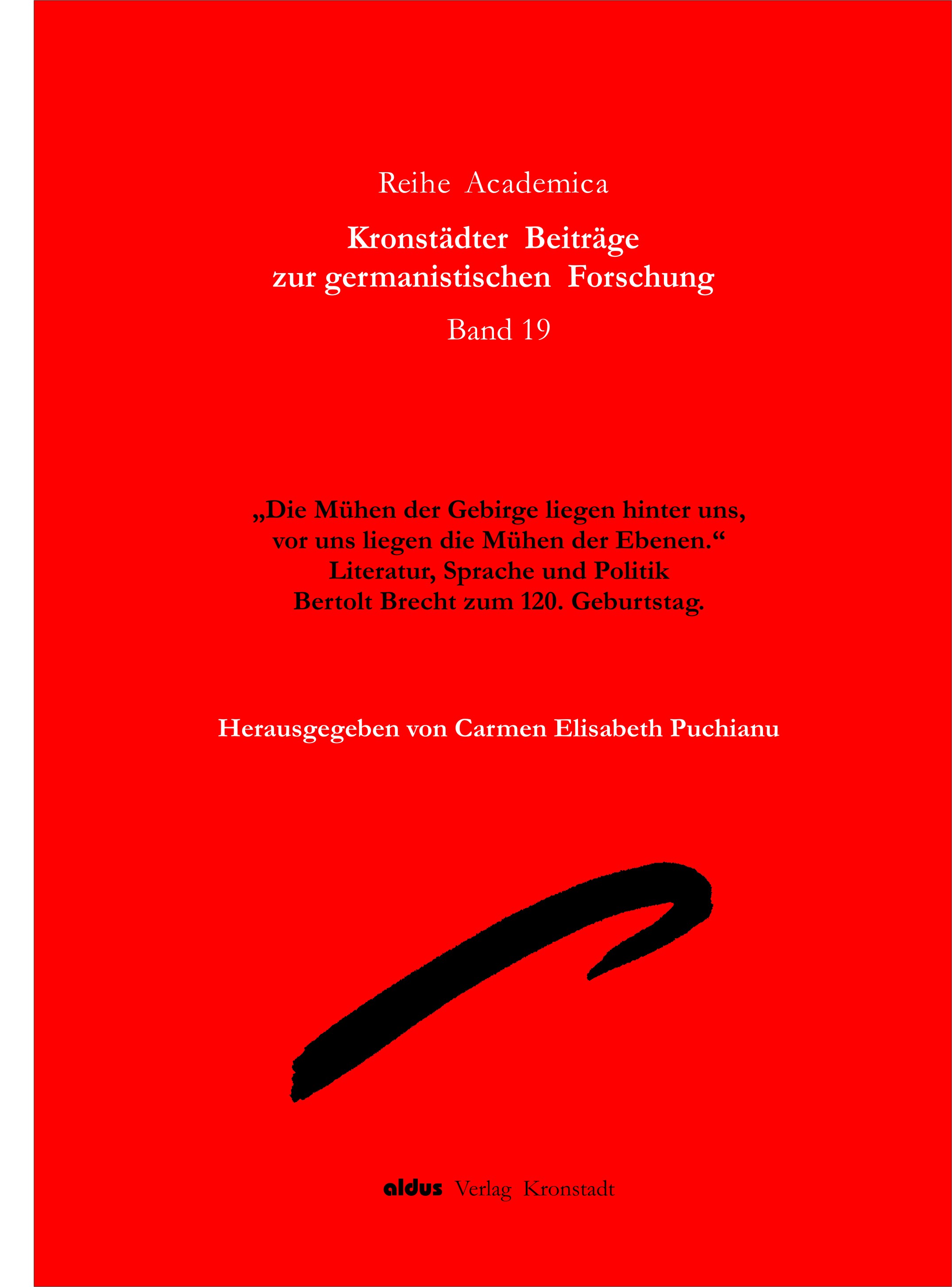
Keywords: Anemone Latzina; Minority Literature; Romanian-German Literature; Brecht-Reception; Poésie engagée;
Vorliegender Beitrag untersucht aus der Perspektive der Hypertextualität die Brecht-Rezeption in der frühen Lyrik der rumäniendeutschen Dichterin Anemone Latzina. Anemone Latzina gehört zu den ersten Autoren der rumäniendeutschen Lyrikszene der endsechziger Jahre, die Brechts Dialektik und sein sozialkritisches Engagement in ihren Versen aufgegriffen hat.
More...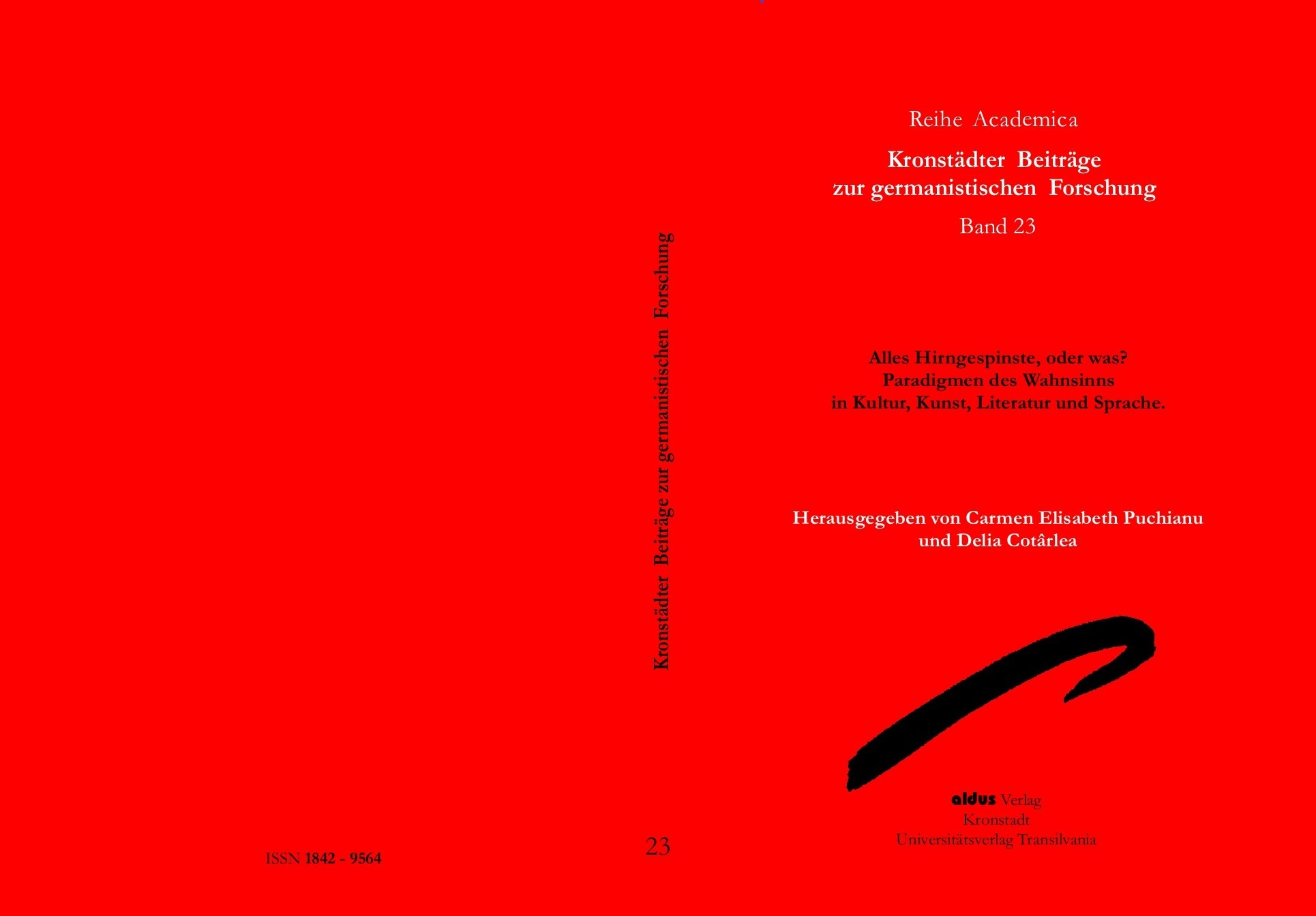
Keywords: The Brașov Conferece on German Studies; paradigm shift; performativity; Quarter-century retrospect, work-in-progress;
Nach fünfundzwanzigjähriger kontinuierlicher Tätigkeit als Tagungsinitiatorin und -leiterin zieht die Verfasserin Bilanz in Form einer Rückschau, die ein akademisches aber auch persönliches Projekt auf seinem herausfordernden Weg von anfänglicher Unsicherheit bis zu seiner wissenschaftlichen Etablierung beschreibt. Das Phänomen 'Tagung Kronstädter Germanistik' wird im Folgenden als lebender Organismus und Work-in-Progress aufgefasst und als Ergebnis eines performativen Aktes resümiert, an dem zahlreiche Aktanten beteiligt sind, und der im Verlauf der Jahre eine Reihe paradigmatischer Veränderungen durchlaufen bzw. generiert hat.
More...